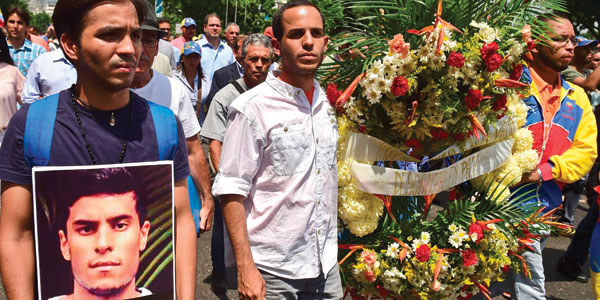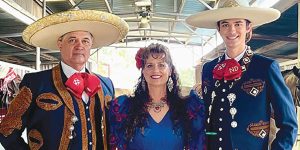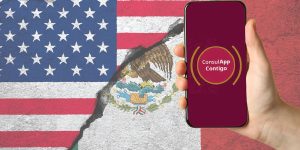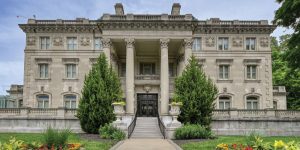
By Jorge Ramos
Have you ever seen a tear gas canister? Some resemble large bullets, about 2 centimeters in diameter, metallic, with a sharp point. Authorities shoot them toward empty spots in a crowd; the canisters then explode and spew a cloud of noxious gas.
In late April, Venezuelan police were trying to disperse crowds in Caracas who were demonstrating against President Nicolas Maduro’s dictatorship when a tear gas canister was shot, point-blank, into the chest of 20-year-old Juan Pablo Pernalete.
It killed him.
Juan Pablo was an outstanding basketball player. He competed in Brazil, Argentina and Chile. His goal was to play in the NBA here in the United States. His bedroom was full of medals and trophies.
One Wednesday afternoon in April, as he had done for months, Juan Pablo joined the marches against the Maduro regime in Caracas. However, everything went terribly wrong that day. “Juan Pablo was killed when a [tear gas] bomb exploded in his heart,” Elvira, his mother, told me recently, sobbing. “That’s how he died.”
The regime explained Juan Pablo’s death differently. Diosdado Cabello, a member of the National Assembly closely aligned with Maduro, labeled demonstrators near Caracas’ Plaza Altamira that day “terrorists” and “assassins.” Later, on television, Cabello insisted that “the National Guard wasn’t even there.”
Elvira is startled when she hears Cabello’s words. “My son is not a terrorist,” she said. “Our son was killed by the National Guard … and I won’t have anyone soil my son’s memory. They killed him — and this pain will never pass. They have no right to kill a human being only because he wanted a better country.”
In an amazing act of defiance — particularly in a country where the slightest questioning of official policies is often considered treason — Venezuela’s Attorney General Luisa Ortega sided with the victim in explaining Juan Pablo’s death. “According to our investigation,” Ortega announced in May, “the student’s death was caused by a heart-induced shock, following trauma in the thorax.”
Translation: Juan Pablo was killed by a tear gas canister aimed directly at him — and only the National Guard uses such canisters.
I spoke to Jose Gregorio, Juan Pablo’s father. “The investigations concluded that our son was killed by the National Guard,” he told me. “They have to assume responsibility for that fact.” He added: “What we want now is justice.”
Juan Pablo’s death is one of dozens that have occurred in Venezuela over months of protests. For the moment, it seems impossible that things will ever go back to a precarious normal. Nothing is normal in Venezuela these days.
Of course, the demise of the dictatorship is one plausible scenario, given all the pressure that the unrest puts on the regime. Even the Chavistas don’t want to see any more young people killed. But another scenario, both plausible and brutal, is an all-out massacre at the hands of the regime, followed by a bullet-based peace.
When a government targets its young citizens, they will take it upon themselves to change the government. In the Venezuela that Juan Pablo and many others imagine, there would be no room for Maduro, Cabello and their thugs.
Before taking office, politicians customarily sell their vision for their country to their fellow citizens. Maduro, however, didn’t have to. He was the handpicked successor of Hugo Chávez, the late Venezuelan strongman. Maduro’s only promise when he came to power was to leave things as they were. But the country is slipping through his fingers.
Venezuelans now have a decision to make: Which country do they prefer? Maduro’s or Juan Pablo’s? Tens of thousands — maybe millions — have already made their decision and taken to the streets.
I asked Gregorio, Juan Pablo’s father, how this will all end. “They [young people like Juan Pablo] are fighting for their ideals. They’re the owners of their futures. History will prove them right.”
Elvira lowers her head, and I hear a soft “amen.”
(Watch my interview with Juan Pablo Pernalete’s parents here: bit.ly/2rA9jNQ.)
La Venezuela de Juan Pablo
No sé si han visto el cartucho de una bomba lacrimógena. Es del largo de dos manos juntas, metálico, y comienza en una punta. Tiene cerca de 2 centímetros de diámetro. La policía los suele tirar a un lugar vacío en una multitud para esparcir el gas y ahuyentar a manifestantes.
Uno de esos cartuchos fue disparado a corta distancia al pecho de Juan Pablo Pernalete en Caracas, Venezuela. Juan Pablo tenía 20 años, y era un destacado basquetbolista. Había competido en Brasil, Argentina y Chile. Su objetivo era ir a jugar a la NBA en Estados Unidos. Su cuarto estaba lleno de medallas y diplomas. Además, tenía varios reconocimientos por su lucha en protección al medio ambiente. Era de esos hijos a quienes uno ve y sonríe.
Y un miércoles en abril lo mataron.
Juan Pablo, al igual que en los últimos dos meses, había ido a una manifestación contra la dictadura de Nicolás Maduro, pero esta vez algo salió mal. Así me lo contó Elvira, su madre. “Juan Pablo muere por una bomba (lacrimógena) que le estrellaron en el corazón,” me dijo entre sollozos. “Por eso muere nuestro hijo.”
El gobierno dio una versión distinta. El diputado oficialista y portavoz del chavismo/madurismo Diosdado Cabello les llamó “terroristas” y “asesinos” a los manifestantes que, como Juan Pablo, protestaban ese día por la Plaza Altamira en Caracas. Luego, en televisión, aseguró que “no estaba la Guardia Nacional ahí.”
Elvira brinca cuando le pongo un video con las declaraciones de Cabello. Juan Pablo “no es un terrorista,” me dice. “A nuestro hijo lo asesinó un Guardia Nacional … No acepto … que nadie venga a manchar la memoria de mi hijo. Me lo asesinaron — y este dolor nunca va a pasar. … No hay derecho a quitarle la vida a un ser humano nada más por querer un mejor país.”
En un asombroso acto de desafío — particularmente en un país donde el más mínimo cuestionamiento a las políticas oficiales es visto como traición — la fiscal general, Luisa Ortega, se puso del lado de las víctimas: “De acuerdo a nuestra investigación la muerte del estudiante se produce por un ‘shock’ cardiogénico por traumatismo cerrado del tórax.”
Traducción: Juan Pablo murió por una bomba lacrimógena dirigida a su pecho. Y sólo la Guardia Nacional tiene ese tipo de bombas.
José Gregorio, el padre de Juan Pablo, quiere ir más allá de saber la verdad. “Las investigaciones dan como cierto que a nuestro hijo lo mató un Guardia Nacional,” me dijo. “Que asuman la responsabilidad respecto al hecho.”
Ella: “Nosotros ahora lo que queremos es justicia. La verdad salió por más que traten de manipular.”
La pregunta — la gran pregunta — en Venezuela es el desenlace. Tras más de dos meses de protestas y decenas de muertos, ¿qué sigue? Por el momento parece imposible que las cosas regresen a una precaria normalidad. Nada es normal hoy en día en Venezuela.
Por supuesto, un escenario es la caída de la dictadura — por la presión de las manifestaciones y el descontento popular, incluso entre chavistas, o por la media vuelta de los militares que no quieren seguir matando a jóvenes. Pero otro escenario, posible y brutal, es una masacre de enormes proporciones — un día de luto, de esos que quedan en los libros de historia — y luego paz en base a balas.
Cuando un gobierno mata a los más jóvenes, esos mismos jóvenes se encargarán de cambiar a su gobierno. Los dos no caben en el mismo país. En la Venezuela que se imaginó Juan Pablo no caben Maduro, Diosdado y sus matones.
Cuando un político llega al poder suele venderles a sus ciudadanos una idea de país. Lo hizo igual Donald Trump y Barack Obama que Fidel Castro y Hugo Chávez. En el caso de Maduro no fue así. Lo puso Chávez de dedazo, y su única promesa fue dejar las cosas como estaban. Pero no pudo. El país se le fue de las manos.
Ahora los venezolanos tiene una decisión muy fácil. ¿Cuál Venezuela prefieren: la de Maduro o la de Juan Pablo? Miles, millones quizás, ya escogieron en las calles.
¿En qué termina esto José Gregorio? “Ellos (los jóvenes como Juan Pablo) están luchando por sus ideales. Ellos son los dueños de su propio futuro. La historia les dará la razón.”
Elvira sólo baja la cabeza, y le oigo un suave “amén.”
(Posdata: La entrevista por televisión con los padres de Juan Pablo Pernalete la pueden ver aquí: bit.ly/2rA9jNQ.)










